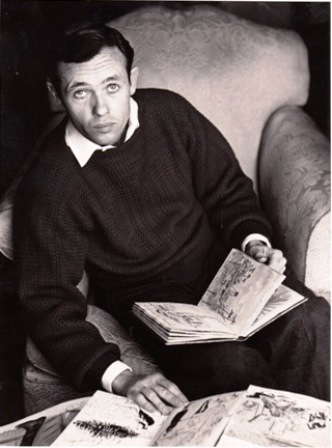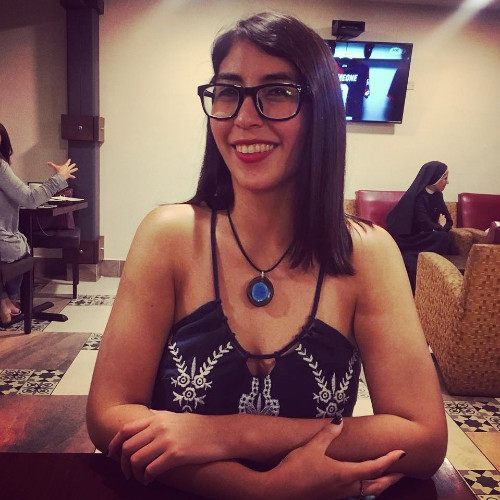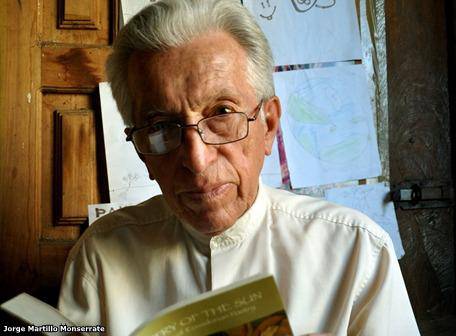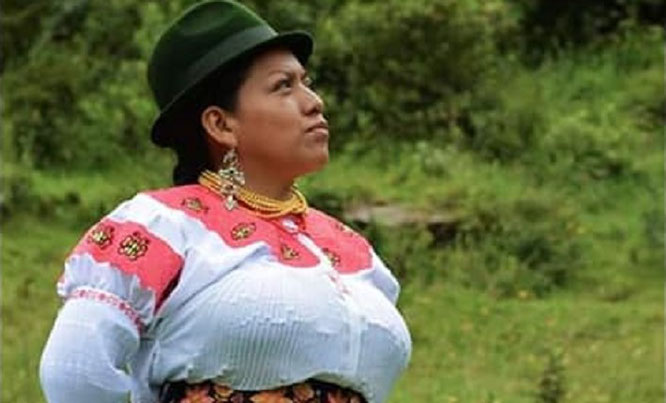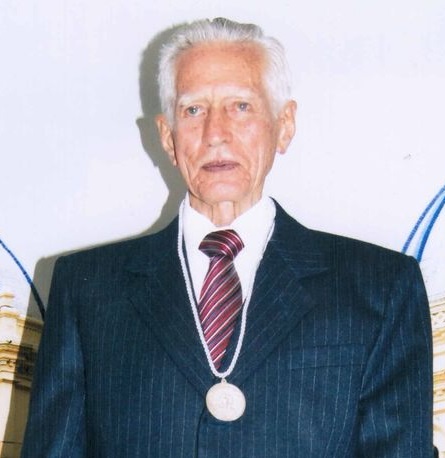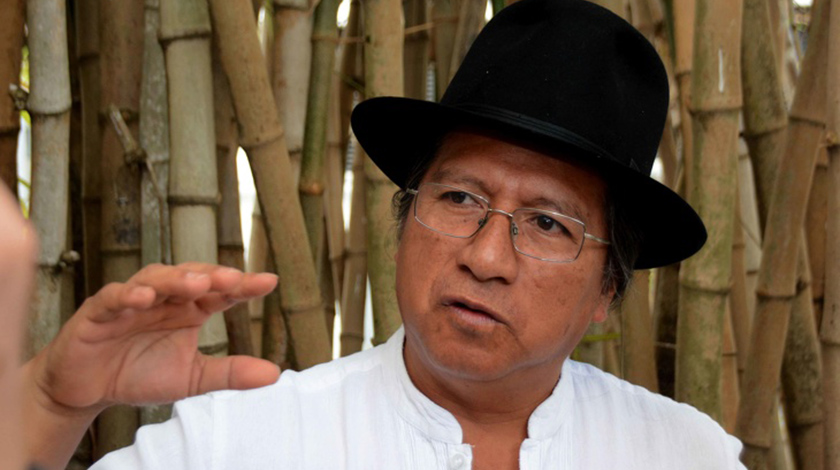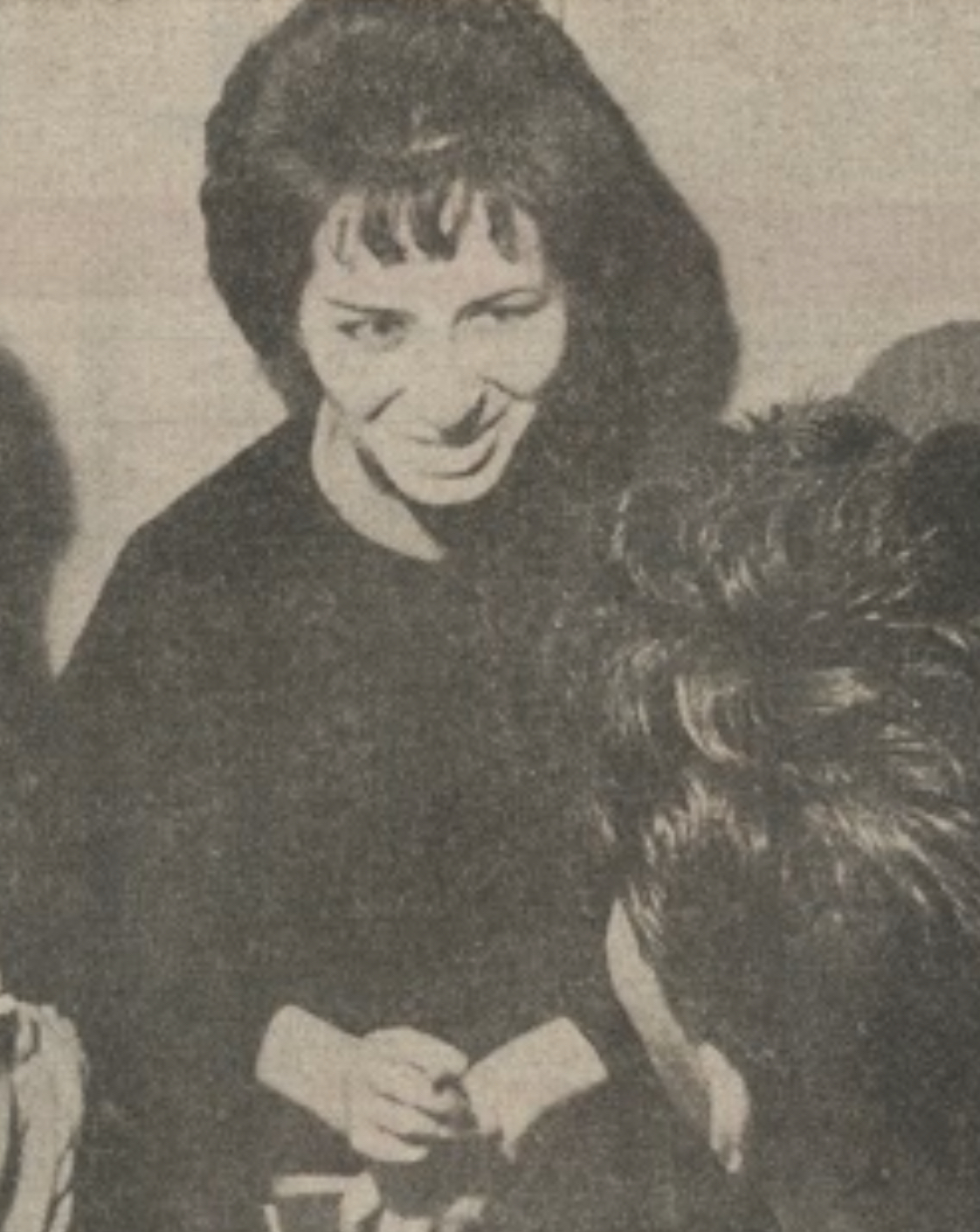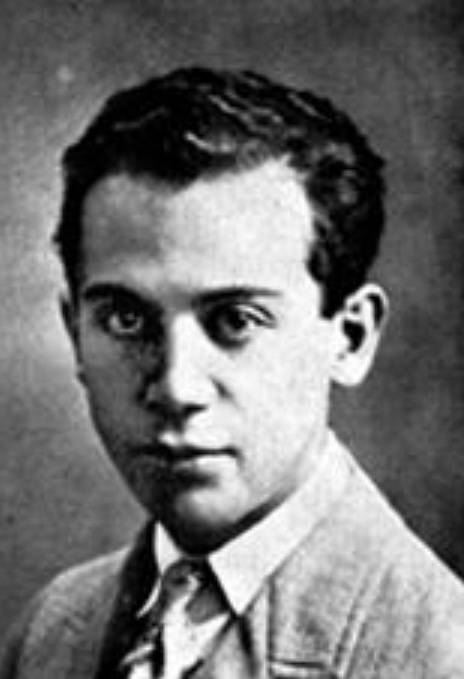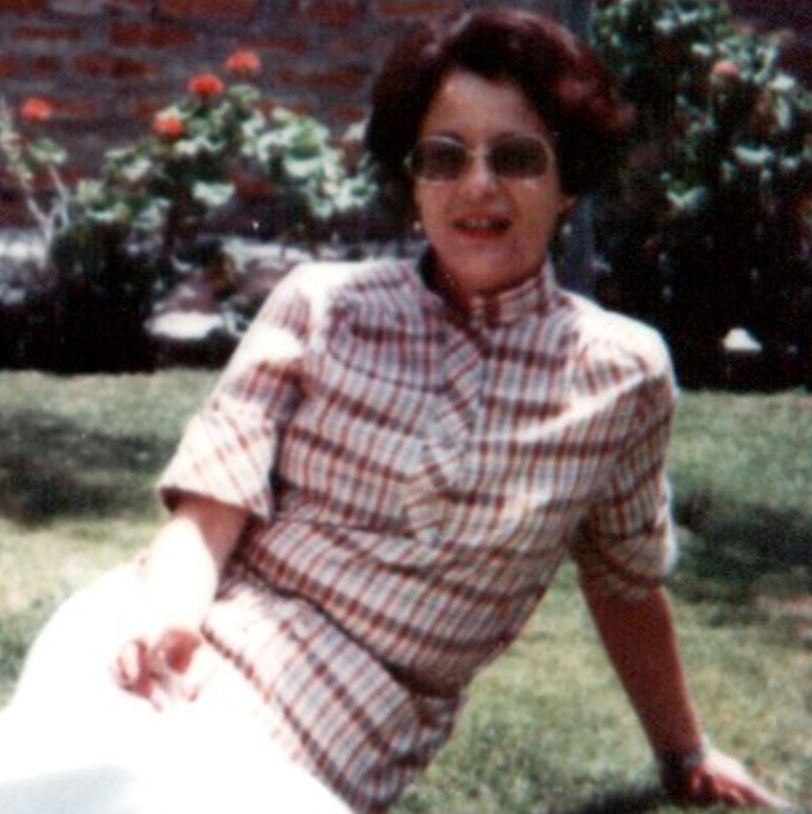Eduardo Solá Franco (Guayaquil, Ecuador 1915 – Santiago, Chile, 1996) was a prolific and multi-faceted artist, perhaps the most diverse Ecuador has ever produced. His staggering output included not only hundreds of paintings in a variety of styles but also sculpture, illustrations for magazines and film, stage scenery, plays, poetry and novels, choreographed ballets, award-winning experimental films and, perhaps most intriguing of all, a series of 14 illustrated diaries in which he recorded, “all that which I saw of interest and that attracted me: people, landscapes, cities, states of being, spectacles, parties, and fashion.” He was also a public figure, he served for years as Ecuador’s cultural attache in Rome, mingling with artists, thinkers, and society figures of Europe, the United States, and South America.
Continue reading “Eduardo Solá Franco”Month: October 2022
Mariella Toranzos
Mariella Toranzos Narváez (Guayaquil, January 24, 1988) is an Ecuadorian journalist, poet, and editor. Before becoming the Society editor for the daily newspaper Diario Expreso, she worked at the paper as a news reporter covering politics, and, as the sub-chief of its Guayaquil section, covering cultural topics. She has also written features on contemporary Ecuadorian authors, helping to introduce them to wider audiences. As a poet, she has participated in the Ileana Espinel Poetry Festival as well as other literary events in Guayaquil.
Continue reading “Mariella Toranzos”Hipólito Alvarado
Hipólito Alvarado Espinosa de los Monteros (Guayaquil, 1929 – Guayaquil, 2016) was an Ecuadorian writer, novelist, and poet. He published the short story book, “La segunda voz” (1975) and the poetry book “Más allá del tiempo y las imágenes” (1986). Some of his poems were translated into English and included in the anthology “Tapestry of the Sun. An Anthology of Ecuadorian poetry” (2009) by Alexis Levitin and Fernando Itúrburu. Hipólito Alvarado’s non-fiction books include: “Una celebridad llamada soya” (1985) and the first volume of “Cómo escribir un cuento” [How To Write A Story] (2001).
Continue reading “Hipólito Alvarado”Agustín Vulgarín
Agustín Vulgarín Marín (Guayaquil, 1938 – 1986) was a poet, fiction writer, actor, and playwright. He penned several notable poetry books, including works such as “El pez que fuma” (1964), “El bosque de las estatuas” (1974), and “Cuadernos de Bantú” (1977). Vulgarín’s literary talent also encompassed the realm of drama, with plays like “Atahualpa: drama en dos actos” and “La Mayasquerita: drama en tres actos.” Furthermore, he left two unpublished novels, “Alfeo el de las iguanas” and “Los poriparalos.”
Continue reading “Agustín Vulgarín”Gladys Potosí Chuquín
Gladys Potosí Chuquín (Angochagua, Imbabura, February 17, 1981) is an Ecuadorian poet and activist who is a member of the Kichwa-Karanki indigenous community. Like the Otavalo, the Natabuela, and the Puruhá, the Karanki are a pre-Inca tribe who adopted the Kichwa language (Quechua) as a result of Incan influence. However, the Iberian invasion that followed the Inca one eventually imposed Spanish as the main language in the Andean area where she is from. She stopped writing in Spanish so that she could find her voice in Kichwa (Quechua), and her poetry serves as a witness to or reflection of the changes that have occurred among her people and herself. She has represented Ecuador at various literature festivals in and outside of Ecuador.
Continue reading “Gladys Potosí Chuquín”Jacinto Cordero Espinosa
Jacinto Cordero Espinosa (Cuenca, June 25, 1926 – September 29, 2018) was an Ecuadorian poet. He authored several poetry collections and his poems have been included in various poetry anthologies both at home and abroad. In addition to being a professor in the Faculty of jurisprudence at the University of Cuenca, he was the director of the Azuayan Folklore Institute and president of the Commission of the Castle of Ingapirca. He was a recipient of the National Cultural Merit Medal from the House of Ecuadorian Culture. He also received the Cultural Merit Medal from Ecuador’s Ministry of Education. He was a corresponding member of the Ecuadorian Academy of Language and a member of the House of Ecuadorian Culture. Some of his poems have been translated into English, French, Portuguese, and German.
Continue reading “Jacinto Cordero Espinosa”Ariruma Kowii
Ariruma Kowii, born Jacinto Conejo Maldonado (Otavalo, Imbabura, Ecuador, August 4, 1961) is considered one of the most important poets writing in the Quechua language. His debut poetry collection Mutsuctsurini (1988) was one of the first books to be written and published exclusively in Quechua. He is also a columist for the Quito newspaper Hoy. In 2007 he was appointed Undersecretary of Education for the Indigenous Peoples of Ecuador in the Ministry of Education, responsible for Intercultural Dialogue. He teaches Literature and Cultural Studies at the Simón Bolívar Andean University. He is the brother of the mayor of Otavalo, Mario Conejo Maldonado.
Continue reading “Ariruma Kowii”Saranelly de Lamas
Saranelly de Lamas, aka Saranelly Toledo de Lamas (Riobamba, 1933 – Guayaquil, 1992) was a poet, journalist and fiction writer. As a journalist she was the Cultural Correspondent of the newspapers El País and Occidente (Cali, Colombia) and El Tiempo de Bogota (New York, U.S.) and editor of the Art Page of the newspaper El Nacional (Caracas, Vezenuela). Her major works include: “Revenant” (1961), “Crónicas para un lugar desconocido” (1982) “Orfeo y otros cantos,” and “Los peces de jade cantan a la Paz.”
Continue reading “Saranelly de Lamas”María Luisa Lecaro
María Luisa Lecaro Pinto (Guayaquil, Ecuador, date of birth unknown – date of death unknown) was an Ecuadorian poet and pioneering feminist known for her avant-garde poetry and progressive social critiques. Writing as “Tatá” for her poetry and “Sor Marisa” in feminist essays, she contributed to Savia, Ecuador’s foremost avant-garde journal, where her work stood out for its surrealism, irony, and bold departure from the sentimental norms of the time. In 1927, Lecaro gained recognition when she placed second in Savia‘s poetry contest, with Hugo Mayo, a leading figure in Ecuadorian avant-garde, taking first. Lecaro’s essays fiercely challenged the patriarchal influence of the Catholic Church, advocating for women’s independence and self-reliance in a socially restrictive era. Although her work was largely overlooked for decades, her contributions were rediscovered in 1999 through Rodrigo Pesántez Rodas’s anthology Del Vanguardismo hasta el 50, which solidified her place as a significant voice in Ecuadorian literature and early feminist thought.
Continue reading “María Luisa Lecaro”Edgar Ramirez Estrada
Edgar Ramirez Estrada (Guayaquil, May 5, 1923 – April 9, 2001) was an Ecuadorian poet and psychiatrist. He published 6 poetry collections during his lifetime and his work has been included in several anthologies. His work was admired and championed by many renowned Ecuadorian literary figures such as Alejandro Carrión Aguirre, Miguel Donoso Pareja, and Carlos Eduardo Jaramillo. Beginning with his poetry collection “Derrumbe” (1969), his style of poetry has been referred to as anti-poetry or no-poetry. All of his books were published by the House of Ecuadorian Culture. He was the son of one of Ecuador’s most important poets, Aurora Estrada y Ayala. He was also the brother of novelist Alcino Ramírez Estrada and poet Isabel Ramírez Estrada.
Continue reading “Edgar Ramirez Estrada”Augusto Arias
Augusto Arias Robalino (Quito, March 15, 1903 – Quito, August 24, 1974) was an Ecuadorian poet, essayist, biographer, anthologist, scholar, university professor, and literary critic. His poetry collection Del Sentir (1920) reflects the modernismo movement of early twentieth-century Ecuador. Arias was a passionate scholar of Ecuadorian letters and authored influential studies, including Panorama de la Literatura Ecuatoriana (1936), España en los Andes (1950), and El Viajero de Papel (1968). He also produced biographical studies on prominent figures such as Eugenio Espejo, Luis A. Martínez, and Pedro Fermín Cevallos. Additionally, he co-edited Antología de Poetas Ecuatorianos (1944) with Antonio Montalvo, marking one of the earliest collaborative efforts to document and celebrate Ecuadorian poetry.
Continue reading “Augusto Arias”Humberto Vacas Gómez
Humberto Vacas Gómez (Quito, 1913-Quito, 2000) was an Ecuadorian writer, literary critic, poet, journalist, and diplomat. As a journalist, his career is tied to the Quito daily newspaper El Comercio. He served as the Minister of Education between 1963 and 1964 and President of the National Union of Journalists. He was a lifelong supporter of democracy and was persecuted by past totalitarian governments for this reason. In 1937, he published his first book of poems, “Canto a lo oscuro,” which was praised by Isaac J. Barrera in his book “Historia de la Literatura Ecuatoriana.” Vacas’ nonfiction books include “La educación artística de las masas,” “Panorama de la pintura ecuatoriana,”and “Los Estados Unidos que yo vi.” A school in Quito bears his name.
Continue reading “Humberto Vacas Gómez”Martha Lizarzaburu
Martha Lizarzaburu, born Martha Emilia Lizarzaburu Dávila (Quito, June 14, 1940 – January 27, 2019) was an Ecuadorian poet and worked as literature teacher for 29 years at the “24 de Mayo” School in Quito. She published 3 poetry collections: “Aljibe” (1964), “Memorial de la sombra y la ternura” (1973), and “Ataduras para el viento” (1977). Her work was also featured in the poetry anthology “Antología de ocho poetas tanáticas del Ecuador“ (2005) edited by Rodrigo Pesántez Rodas.
Continue reading “Martha Lizarzaburu”
